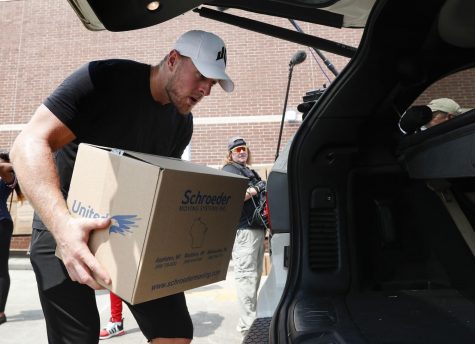Parental Expectations for Academic Success Take Heavy Toll on Students
Parents are the subject of discussion on news channels across the nation, featuring their new ways to “punish” their children. Kids holding up the signs that their parents made for them, displaying the child’s wrongdoing for every person passing by to see is causing uproar among pedestrians. According to Pew Global Attitudes Project, 56 percent of American parents feel the amount of pressure being placed on children is ‘too little.’
“I listen to what my parents have to say and I consider their opinions about school,” sophomore Sarah Abu-Ain said. “But it’s my life and I’m doing what I’m doing to better my chances to get what I want later on. I respect what they think and tell me, but it’s not always the path I want to take.”
The role of parents and how far their influence should go may be a controversial topic debated on the news, but in the mind of senior Allison Borja, the answer was clear.
“I think parents should have a huge involvement in their children’s lives up to a certain age,” Borja said. “A parent’s job is to guide their child in the right direction, and children need the comfort of knowing their parents will always be there for them. As their children near the age of adulthood, parents should slowly back off and let their children learn things on their own.”
Junior Raymond Mendoza agrees with Borja, but understands why his mother felt the need to serve as a guide for him.
“My mother took her own experiences and the ways that her parents approached her as a child as the way to go about helping me,”Mendozasaid. “My mom was pressured as a little girl to be the best student she could be and although it was burdensome at times, it was what she needed to keep her head on straight. My mom took it upon herself to insure that I had the skills I needed to be successful. She was more understanding with me than her father had been with her because she didn’t want me to drown under the stress like she had.”
Borja claims that the oldest child has it harsh, the youngest feels more pressure when trying to fill the shoes of an older sibling.
“When they are the oldest child, I can definitely see how the pressure can be a burden because they are setting the bar for your siblings,” Borja said. “However, the pressure increases the younger you are. As the youngest in my family, I have always felt pressured to do as well as my sister had done in school. When kids are younger, they feel the need to match their sibling’s grade.”
With the importance of GPA having been drilled into his head from the first day of freshmen year,Mendozasaid that high school was the breeding ground for parental pressure.
“I noticed that my mom was trying to be helpful with school work at the beginning of my freshmen year,”Mendozasaid. “I was struggling in one of my advanced classes and she opened my eyes to the proper ways of taking on school work and the smart and useful methods for studying. She took time out of her schedule to sit me down and show me everything she remembered about studying for school.”
Although some students credit their parents for being the reason behind their success in school, some claim that they would be just fine on their own.
“My parents helped me understand the importance of education, but I think that even without them pressuring me I would have done just as well in school because I knew from the get go that I wasn’t one to take high school as a joke and just throw my life away,” Abu-Ain said.
Health science teacher Stacey Jones said she thinks parents do at times see fit to add in words of encouragement to help boost their child’s confidence in school. Motivation and pressuring do not have a fine line separating them.
“Motivation does not become pressuring,” Jones said. “Some kids an extra push and have the ‘you need to do well’ rather than ‘I hope you do well.’ There are kids who need the pressure to know that their parents are paying attention to them. It all depends on the kid, and parents know what works with their child.”
According to Pew Global Attitude Project, only nine percent of Japanese parents feel as if their children are not being pressured enough compared to the 59 percent that think their children are being pushed too hard.
“My grandfather is fromChinaand he was hard on my mother as a child,”Mendozasaid. “He expected the best out of her and if he didn’t get it, he would push her even harder. I think that parents in theUnited Statesallow their children more freedom and give them the space they need to figure out their own lives as compared to other nations where parents spring their own dreams and desires on to their kids and expect them to follow through.”
Even though many are quick to label excitable parents as oppressive and obsessive when they turn to so-called ‘barbaric’ ways of raising their children, a light needs to be shed on the way those same parents were raised to fully understand their behavior Borja said.
“My mom always tells me about her years in high school and how all she would do was study,” Borja said. “I think that aside from the pressure from her parents, she set high expectations for herself. When looking back at her school days and the pressure from her school days is the reason she is where she is today, it’s only natural for her to want the same for me.”








